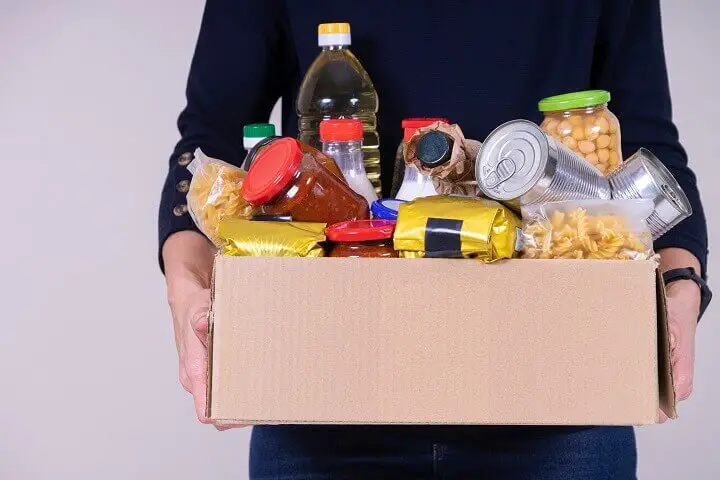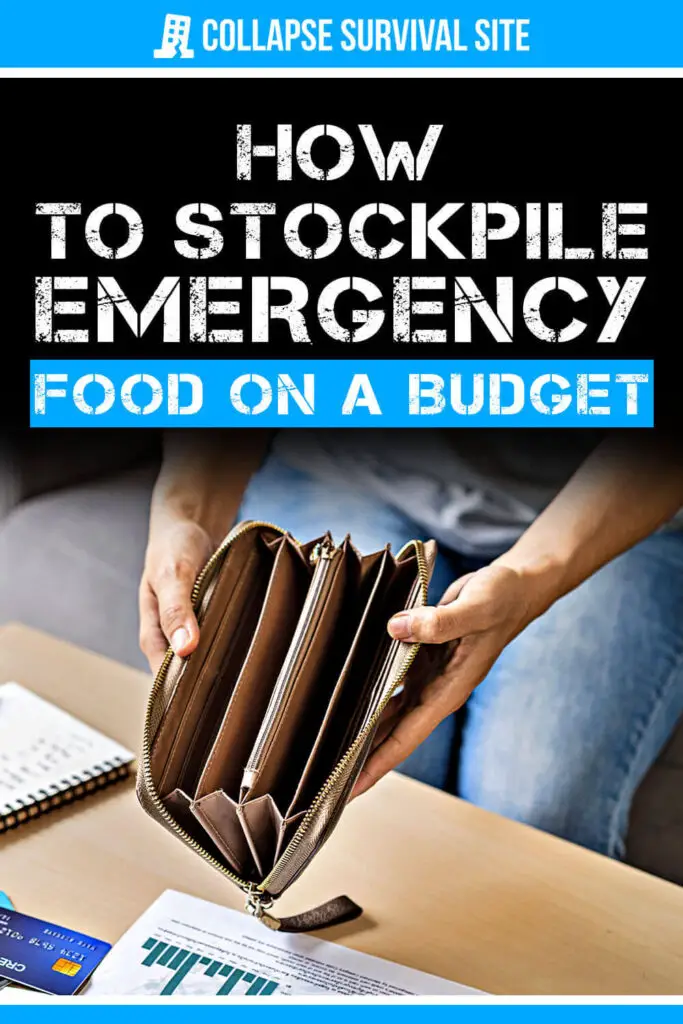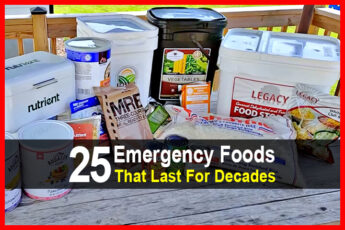Estimated reading time: 11 minutes
Inflation is having numerous impacts on society and people’s ability to buy the things they need. That includes prepping.
Being able to afford extra food for a stockpile is challenging enough as it is, and it keeps many potential preppers from taking the plunge. With people’s budgets stretched more than ever by rising costs, even those of us who are committed to being prepared are wondering how to make it all work.
One obvious answer is to change our buying habits, readjusting how we use the money we have and finding ways of cutting unnecessary expenses. That’s challenging and can cause family members to resent your prepping efforts.
While I’m all in favor of living on less and having more money available for the more important things in life, there are other things we can do to make our prepping budget go further. Before cutting things out of the prepping budget, it’s a good idea to try and find ways of spending less on prepping.
There are things we can do to continue stockpiling, even when money is tight. It’s just a matter of using our imagination, the resources available to us and a bit of patience.
Want to save this post for later? Click Here to Pin It On Pinterest!
12 Ways to Stockpile Emergency Food on a Budget
Use Windfalls
Even in tough financial times, there are still opportunities where you might receive a windfall, whether that be your income tax return or a bonus at work. When you do, working on your survival stockpile should be high up on your list, rather than buying that new television set. Of the two, the food is going to ultimately be a bigger blessing for your family.
Avoid “Survival Food”
I’ve got nothing against the companies which package food for survival. Nevertheless, when I look at the prices they charge, one thing is imminently clear – I can do it cheaper myself.
Much of what you’re paying for isn’t the food itself, as what they provide is actually rather inexpensive food, but rather the labor required to turn those ingredients into “one pan meals.” That’s something that any of us can do, and we can probably make taste better than they do.
One pan meals are great for survival and basically consist of a combination of ingredients that can be cooked together, essentially turning them into a soup or casserole. Think of Rice-a-Roni, which isn’t sold as survival food, but is great for it.
Any variety of Rice-A-Roni you buy will have rice, cut up spaghetti and spices in the package. You cook them together in water and you’ve got your dish. Take that idea and repeat, using different ingredients to make soup mixes, casserole mixes and side dishes.
The one place where those survival food companies are great is when it comes to food items that you just can’t get most places, like freeze-dried meats, shelf-stable butter, TVP (textured vegetable protein) and dehydrated eggs.
Buy in Bulk

It’s always a good idea to buy in bulk whenever you can. Sam’s Club and Costco make this easy, as they basically sell things in larger packages. But don’t just assume their prices are the best on everything. While they usually have the best price, I’ve found better prices on several items.
If you happen to live in an area with a sizeable Amish or Mennonite population, look around for one of their grocery stores. These small, simple operations operate like a co-op, buying in bulk and repackaging it for their community. Usually, the doors are open to anyone, so you can get a fairly decent variety of food at really incredible prices.
Some grocery stores, like Sprouts, offer bulk foods, stocked in barrels and sold by the pound. The savings here comes from the fact that you’re not paying for packaging. Considering that you’ll probably want to repackage the food for long-term storage anyway, that’s a savings worth grabbing.
One of the really great things to buy in bulk are spices. I firmly believe in having a good stock of spices on hand. You’re going to be eating a lot of unfamiliar food in a survival situation, and the best way to make that food palatable for your family is to season it, so that it tastes like something they’re familiar with.
You can buy restaurant-sized containers of spices from Sam’s Club, much cheaper than the little ones at the grocery store. If you live in an area with a large Mexican-American population, buy the Mexican spice brand; it’s a whole lot cheaper.
Go Out in the Country
There are a number of farmers who sell their produce directly from their farms or at farmer’s markets. You don’t have to limit your buying to the grocery store. Not only will the produce you buy from them be cheaper, but it will be fresher as well.
Much of what is picked for the grocery store is picked early, so that the produce doesn’t go bad. What these farmers sell directly is usually left to grow a bit longer, allowing for much better flavor.
You can also get meat the same way. You might not save a bunch of money buying meat that way, but you will generally get a better cut of meat. Considering that you’re going to be preserving the meat, the better cut will result in better preserved foods.
Restaurant Supply
Another good source for bulk food is any restaurant supply. Most will require that you set up an account with them, but it’s worth the hassle. The money you’ll save on buying large quantities of foodstuffs will pay for the time you have to invest in setting up that account.
A lot of the food that restaurant supplies sell these days is premade frozen food that restaurants only need to heat and plate. But they still sell more basic things, like flour and butter. They’re also a great place to buy things like aluminum foil and food wrap, which comes in restaurant-sized rolls.
It’s not a food item, but you might want to consider buying at least one restaurant-sized stock pot. When it comes to living off of what you can grow, gather, and hunt, there will probably be times when you need to cook a large amount of something.
Start Couponing
Couponing seems to be becoming a lost art, but food manufacturers are still sending coupons out by the truckload. Not only that, but you can find them online, where they are much easier to collect. That’s not to say you shouldn’t gather them from your newspaper if you’re already getting the Sunday paper, just that doing it online is faster.
Catch the Sales

Food goes on sale, just like anything else. Sometimes on really good sales. That’s a real boon for preppers, who might want to buy more of an item than the store will be comfortable with. But there are ways around those limits they put on your purchases, like having the whole family go in and each buy the limit. I’ve picked up mac & cheese for a dime a box, canned chicken for a buck, and a host of other great buys.
These sales follow a pattern, so it is worthwhile to learn when things are normally on sale, not just for the sake of building your stockpile, but also for your family’s regular food budget. Anything you can save on your grocery bill will allow you to buy a little more for your stockpile.
One of the best food deals you can grab in the grocery store is frozen turkey, just before Thanksgiving. It seems that every grocery chain puts turkey on sale then, usually for less than half the normal price. Buy several and cut them up as they thaw, to make jerky out of.
Can Your Own
While canned foods are reasonably cheap, you can still save money if you are already growing the food in your garden. For canning purposes, you’re best off growing a lot of the same thing, so that you can do your food preservation in batches, rather than just a few jars full of each veggie. The more you can do at one time, the more cost- and labor-effective it is.
One of the big advantages to home canning is that you don’t have to go with the same dull food that you find in the grocery store. If you’re going to can beans, go ahead and add the ham to them now, so that the flavors can mix. The same idea can extend to mixing some bacon bits into your sting beans or pimentos into your corn.
Make Your Own
Don’t just stop with canning, though. The real money savers come in when you make other kinds of food and preserve them. Dried meat and fruit are expensive, but it’s much less costly to dehydrate your own, especially if you get the foods to dehydrate on sale or directly from the farm.
I regularly make my own jerky, including the turkey jerky I just talked about, as well as apple butter, pumpkin butter, nut butters, fruit roll-ups, and various other things.
Keep in mind that any time you’re buying something that’s already done, you’re paying for someone else’s labor. While commercial food processing is largely automated, there is still some labor involved. That’s especially true when it comes to foods that are made in small batches.
Take Advantage of the Food Pantry
You can find a food bank in pretty much any city in the country. These non-profit organizations receive excess stock, damaged shipments, government surplus, food that isn’t selling quickly enough, and any other food that commercial sellers need to get rid of. It is offered to local food pantries for pennies on the dollar, so that they can use it to feed the community.
The question is: Can you get that food? If you’re already on the lower end of the income scale, you likely can; but even if you’re not, there’s a chance that you can still get food from the local food pantry. That’s a moral question that you will have to decide for yourself.

Another way to take advantage of this is if you’re part of a small church that has a food pantry. Befriend whoever is in charge of that food pantry and ask if you can piggyback on their order, adding a case or two of different things that they’re already buying.
Sweetening the deal by offering to buy some food for the pantry will go a long way towards making that idea palatable to them, and you’ll still get the food much cheaper than you can anywhere else.
Gifts
Christmas and birthday gifts can often be a disappointment, especially when family members are buying us gifts that we really don’t want. The solution to this problem is to drop a few hints in the form of a “wish list” for them to use.
While it might be tempting to put a new gun or pair of binoculars on that list, you can also put food for your stockpile on it. That might not seem like an exciting gift to them, but it will probably be much more exciting to you than a new tie or a bottle of after-shave.
Cut Your Own Wood
It’s not food, but you need it for food, so I’m going to include it here. I’m talking about firewood. Heating the average home through the winter with wood takes four to six cords of good hardwood firewood. That comes to quite a chunk of money, if you pay someone else to cut and haul it for you. But you can do it yourself a whole lot cheaper.
Actually, if you’ve got a chainsaw and a pickup, you shouldn’t have to pay more than gas and time to get all the firewood you can use. Just drive around your community and look at how many dead trees there are, which are still standing.
Another option is to drive around after a big storm and look for tree limbs that are down. In either case, offer to cut that up and haul it off. Most homeowners will not only let you, but will probably offer to pay you something for it, even if you tell them you’ll do it for free.
You can extend this to other areas as well. Keep your eyes open for opportunities, like trees in public places which need to come down or which have limbs down after a storm. Talk to your city works department and get their permission to cut up any down limbs you see. They’ll probably appreciate the help.
But don’t just go and cut them without making that contact first; you don’t want to get hassled for being a public-spirited citizen.
Another good source for wood is construction sites. You really don’t want construction scrap, but if you find some land that’s being cleared for a housing development, shopping center, or school, chances are that there will be trees that need to come down.
Talk to the contractor first to find what trees need to be cut. He may be planning on taking them down with a bulldozer (that’s common), but they’ll still need to be cut up and hauled off. That’s where you come in.
Like this post? Don't Forget to Pin It On Pinterest!









